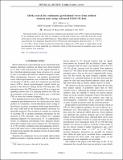All-sky search for continuous gravitational waves from isolated neutron stars using Advanced LIGO O2 data
Author(s)
LIGO Scientific Collaboration; Virgo Collaboration; Aggarwal, Nancy; Barnum, Sam; Barsotti, Lisa; Biscans, Sebastien; Buikema, Aaron; Demos, Nicholas; Donovan, Frederick J; Eisenstein, Robert Alan; Evans, Matthew J; Fernandez Galiana, Alvaro-Miguel; Fishner, Jason M.; Fritschel, Peter K; Gras, Slawomir; Hall, E. D.; Katsavounidis, Erotokritos; Kontos, Antonios; Lane, B. B.; Lanza Jr, Robert K; Lynch, Ryan Christopher; MacInnis, Myron E; Mansell, Georgia; Mason, Kenneth R; Matichard, Fabrice; Mavalvala, Nergis; McCuller, Lee P; Mittleman, Richard K; Ray Pitambar Mohapatra, Satyanarayan; Ng, Kwan Yeung; Shoemaker, David H; Sudhir, Vivishek; Tse, Maggie; Vitale, Salvatore; Weiss, Rainer; Whittle, Christopher Mark; Yu, Hang; Yu, Haocun; Zucker, Michael E; ... Show more Show less
DownloadPublished version (3.354Mb)
Publisher Policy
Publisher Policy
Article is made available in accordance with the publisher's policy and may be subject to US copyright law. Please refer to the publisher's site for terms of use.
Terms of use
Metadata
Show full item recordAbstract
© 2019 American Physical Society. We present results of an all-sky search for continuous gravitational waves (CWs), which can be produced by fast spinning neutron stars with an asymmetry around their rotation axis, using data from the second observing run of the Advanced LIGO detectors. Three different semicoherent methods are used to search in a gravitational-wave frequency band from 20 to 1922 Hz and a first frequency derivative from -1×10-8 to 2×10-9 Hz/s. None of these searches has found clear evidence for a CW signal, so upper limits on the gravitational-wave strain amplitude are calculated, which for this broad range in parameter space are the most sensitive ever achieved.
Date issued
2019Department
LIGO (Observatory : Massachusetts Institute of Technology); Massachusetts Institute of Technology. Department of Physics; MIT Kavli Institute for Astrophysics and Space ResearchJournal
Physical Review D
Publisher
American Physical Society (APS)